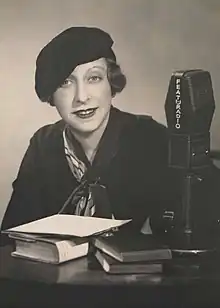Jean Campbell (novelist)
Jean May Campbell (20 May 1901 – 10 December 1984) was an Australian novelist and literary personality.
Jean Campbell | |
|---|---|
 Campbell c. 1935 | |
| Born | Jean May Campbell 20 May 1901 Melbourne, Victoria, Australia |
| Died | 10 December 1984 (aged 83) St Kilda East, Victoria, Australia |
| Occupation | Novelist |
Early life
Campbell was born in Melbourne on 20 May 1901, the daughter of Louise (née Bollinger) and John McNeil Campbell. Her father, born in Scotland, worked as a bank manager. She attended Presbyterian Ladies' College, Melbourne, where she led the debating team and was editor of the school magazine. Campbell briefly attended the University of Melbourne on a non-degree course. She became a licentiate of the Trinity College of Music and worked as an elocution instructor.[1]
Career
Campbell's unpublished first novel Plato the Impossible was written while she was a student, for a contest run by C. J. De Garis.[2] In 1933, her work Brass & Cymbals was published by Hutchinson, studying "the strains experienced by a Jewish immigrant family in Melbourne". Hutchinson published four further novels – Lest We Lose Our Edens (1935), Greek Key Pattern (1935), The Red Sweet Wine (1937), and The Babe Wise (1939) – which shared in common an urban setting and ethnically diverse characters.[1] Campbell was a prominent literary personality, making frequent appearances in newspapers and magazines. She had her portrait painted by her friend Lina Bryans.[2]
During World War II, Campbell was employed as a censorship officer in the Department of Defence and Department of Information.[3] She wrote fourteen anonymous pulp fiction romances between 1943 and 1945,[1] which were published by the New Century Press in Sydney.[3] She was awarded a Commonwealth Literary Fund fellowship in 1947 to a write a novel about "a neglected Melbourne adolescent boy", however the work – titled Runt – was never published.[1]
Campbell was state president of the Fellowship of Australian Writers from 1954 to 1955 and was also secretary of the Melbourne Little Theatre. In 1955 she helped organise a book week for the inaugural Moomba Festival, together with Andrew Fabinyi and Lina Bryans. In her later years, Campbell appeared in a number of art films, including three by Paul Cox. She narrated his short documentary We Are All Alone My Dear (1975) about life in her retirement village.[1]
Personal life
In 1921, Campbell became the mistress of John Rose Gorton, a businessman whose son John Grey Gorton became prime minister of Australia.[1] She lived intermittently with him at his Mystic Park estate until his death in 1936.[2] She died in St Kilda East, Victoria, on 10 December 1984, aged 83.[1]
References
- Arnold, John (2007). "Campbell, Jean May (1901–1984)". Australian Dictionary of Biography. Vol. 17.
- De Lacy, Gavin (May 2009). "Three Neglected Women Writers of the 1930s: Jean Campbell, 'Capel Boake', and 'Georgia Rivers'". The LaTrobe Journal (83).
- "Campbell, Jean (1901-1984)". East Melbourne Historical Society. Retrieved 3 July 2022.